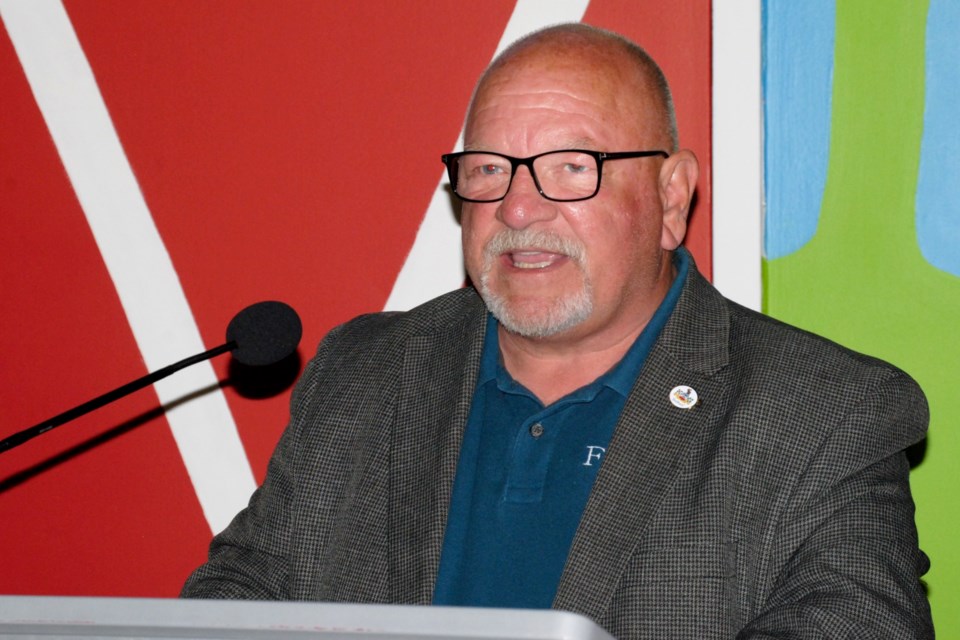The province’s proposed allotment of additional power to Ontario mayors is receiving a lukewarm reception in Greater Sudbury, with Mayor Brian Bigger questioning its relevance.
“I’m not sure what they’re thinking, how deeply they thought about it, and we’ll leave it at that,” he told Sudbury.com by phone from Ottawa this week, where he is advocating for various local needs with provincial officials at an Association of Ontario Municipalities convention.
Questioning, “isn’t this a democracy?” he said giving greater power to Ontario mayors might create a more divisive environment around council chambers.
On the table is a proposal by the province to allow mayors the right to override council approval of bylaws that would hamper a set of provincial priorities to be set out in regulations.
An example provided by the province is their goal of building 1.5 million homes in 10 years and building critical infrastructure.
A city council could override the mayor’s veto with a two-thirds majority vote.
The proposed legislation would also give mayors the responsibility for preparing and tabling their city’s budget, instead of council, appointing a chief administrative officer and hiring and firing department heads, except for statutory appointments such as an auditor general, police chief and fire chief.
“I think there’s a strong call by mayors across Ontario to better understand the province’s plans and to give further details,” Bigger said, adding the province’s proposal has evolved dramatically in recent days. It was initially proposed to affect only Toronto and Ottawa, with Premier Doug Ford later suggesting it might be expanded to include other cities as well.
“This was not on anybody’s radar, so we’re trying to find out more information from the province, “Bigger said.
As it relates to Greater Sudbury, Bigger said the proposed legislation might not carry much relevance. Although council has appeared divided in recent months, he said much of the division related to the now-defeated Kingsway Entertainment District – a municipal arena/events centre proposed to be located on The Kingsway alongside a private hotel and casino.
The majority of city council votes have been backed by a strong majority of council, he said, particularly as it relates to the housing issue the Ford government has set as a priority.
In recent weeks, a strong majority of city council members approved a 40-unit transitional housing complex, a 14-unit affordable housing complex on Sparks Street and for the not-for-profit Raising The Roof-Chex Toit to retain tax-exempt status for five single-family dwellings they intend to retain as affordable housing.
With a municipal election looming on Oct. 24, it’s also worth noting what the city’s mayoral candidates have to say about the proposed legislation.
As of Tuesday afternoon there were 10 mayoral candidates registered with the city.
Sudbury.com reached out to all registered mayoral candidates earlier this week for comment, and in addition to Bigger received a response from Miranda Rocca-Circelli, Don Gravelle, Paul Lefebvre and Evelyn Dutrisac.
Subsequent to Sudbury.com issuing the inquiry, local businessman Tony Monteleone registered as a mayoral candidate. Convicted purveyor of hate speech and perennial fringe candidate David Popescu has also since registered.
Lefebvre told Sudbury.com there are too few details on the proposed legislation to offer a robust opinion, but his gut reaction is that the current system, which requires a majority vote of council, has worked thus far.
“That’s how a democracy works – you work with others, and that’s what I intend to do,” he said, adding the majority of city council members appear to hold the city’s need to expand its inventory of housing across the as a priority.
“It is a priority of mine and I believe it’s a priority for all of Sudbury to have housing, from homeless … to regular housing.”
Relaying a story of someone declining work in Greater Sudbury due to limited housing options available in the Nickel City, Lefebvre said it’s an issue that spans across the board.
Gravelle said the proposed legislation could “easily be a recipe for disaster should a mayor abuse their power.”
There might also be an upside, he added.
“If the mayor has the ability to hire and fire department heads, then those positions must be on contract for the same term as council to avoid extra expenses after letting a person go,” he said. “This would then allow the mayor to bring their platform to life and see it through.”
Rocca-Circelli said there doesn’t appear to be a need for the proposed legislation in Greater Sudbury, but there are other areas the province should look at when it comes to affording greater power to municipalities.
“The province should allow northern cities with resource-based economies the ability to capture a percentage of the royalties which the province collects on mineral extraction and lumber,” she said.
“As it is right now, there is a precedent for this, as the city receives fees from the operation and extraction of sand and gravel quarries located within the municipality, so why not extend that policy so that the city can receive revenue from mining and logging operations that occur within the municipality as well?”
Dutrisac said there are possible merits to the legislation by encouraging the effective function of council, and that she would not be afraid to use a veto in the event the province were to allow mayors the power.
Further, she said the province should allow municipalities greater power in securing income from sources other than property taxes. The collection of taxes for vacant buildings needs to be faster, parking tickets need to be collected more easily and greater taxation from mining companies need to funnel into the city, “as these companies utilize our road infrastructure and emergency services.”
Other registered candidates include Bob Johnston, Devin Labranche and Mila Wong.
Tyler Clarke covers city hall and political affairs for Sudbury.com.
